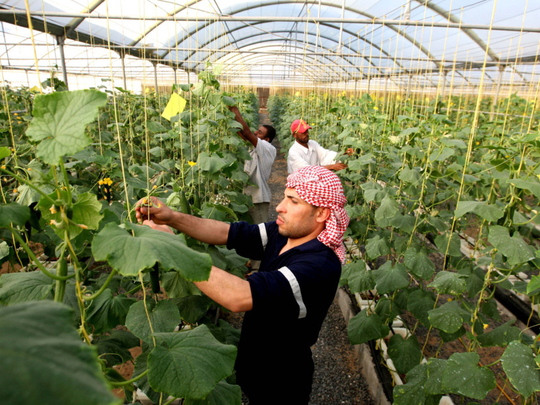
If you look closely at your plate of food the next time you are sitting down for a meal in the UAE, you can be sure that most of the key ingredients used in its preparation have travelled afar — whether they include rice from India, meat from Australia or vegetables from the United States. As a desert country with limited domestic food production, we are highly dependent on food imports and fortunate to be able to access and afford these food products.
However, the agricultural sector across the globe is grappling with significant challenges to produce food sustainably and meet the growing demand as well as mitigate the impact of climate change. One of the main challenges is the increasing loss of agricultural diversity.
Alarmingly, for some crops, as much as 90 percent of that diversity has already been lost. In a bid to stem the tide, the United Nations Sustainable Development Goals Target 2.5 calls for urgent action from the international community to conserve and share crop and livestock diversity. As a champion of the Food Forever initiative, which calls for action by world leaders on this important issue, I strongly echo the urgency of the issue.
The conservation of crop varieties or different breeds of animals, including wild ones, is important, as they may offer stronger and greater resilience to the adverse impacts of climate change than those that are conventionally cultivated or reared. They also hold an important place in sustaining the ecosystems that support global food production.
The UAE has a long history of growing food and grazing livestock on our land. While most of us no longer depend on farming or fishing as a means of livelihood, and much of our food is sourced from abroad, many of us still own a small farm or herd of animals to provide for the immediate needs of family and friends. However, like many other countries in the world, our traditional plant varieties, including fodder and medicinal plants, are becoming less common today. Some fruits, such as Louz and Nabch, that used to be found abundantly on our lands, are now increasingly becoming rare.
To address this issue, the Ministry of Climate Change and Environment is working to enhance the UAE’s food diversity through strategies and programmes that place emphasis on the importance of traditional varieties, as ensuring agricultural diversity in the country is an important factor for a sustainable food system in the long run.
We are working to bring back some of the traditional crop varieties, enhance quality date varieties, promote bee keeping and organic farming, and identify livestock breeds that are suitable to the local environment and present high economic returns. We are also striving to increase the populations of endangered local fish species through the establishment of commercial hatcheries. In addition, we are planting mangroves and deploying artificial reefs in our coastal waters to facilitate breeding grounds.
However, the fact remains that the challenge in achieving agricultural diversity is not confined to food production. We must create incentives for our farmers and cultivators to adopt best practices, develop markets to ensure demand for local produce, promote research and development into the integration of the latest technologies, mobilise adequate financing, and raise consumer awareness.
Some of the work is already underway. For instance, the UAE University in Al Ain has been conducting extensive research on date palm tissue culture as well as on fodder and forage suitable for the UAE’s climatic conditions. Also, organic farming has more than quadrupled over the past five-years due to the growing interest in environmental sustainability and ensuring a healthy diet.
Furthermore, to effectively sustain agricultural biodiversity we need to bring in a greater focus on environmental conservation, given their inextricable connection. As part of this priority, the UAE is implementing a wide range of relevant policies and regulations and is an active participant in international environmental conventions.
I am confident that our efforts here in the UAE will feed into the wider global efforts through the Food Forever Initiative and other relevant programmes and ensure diversity in the food value chain, enabling us to ultimately achieve our collective goal of a sustainable future for all.
- Thani Ahmed Al Zeyoudi is the UAE Minister of Climate Change and Environment.









